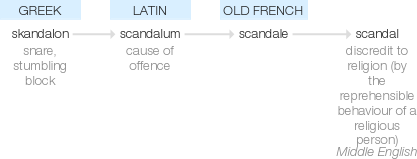Scandal
Middle English (in the sense ‘discredit to religion (by the reprehensible behaviour of a religious person)’): from Old French scandale, from ecclesiastical Latin scandalum ‘cause of offence’, from Greek skandalon ‘snare, stumbling block’.
wiktionary
From Middle French scandale(“indignation caused by misconduct or defamatory speech”), from Ecclesiastical Latin scandalum(“that on which one trips, cause of offense”, literally “stumbling block”), from Ancient Greek σκάνδαλον(skándalon, “a trap laid for an enemy, a cause of moral stumbling”), from Proto-Indo-European *skand-(“to jump”). Cognate with Latin scandō(“to climb”). First attested from Old Northern French escandle, but the modern word is a reborrowing. Doublet, via Old French esclandre, of slander.
Sense evolution from "cause of stumbling, that which causes one to sin, stumbling block" to "discredit to reputation, that which brings shame, thing of disgrace" is possibly due to early influence from other similar sounding words for infamy and disgrace (compare Old English scand(“ignominity, scandal, disgraceful thing”), Old High German scanda(“ignominy, disgrace”), Gothic 𐍃𐌺𐌰𐌽𐌳𐌰( skanda, “shame, disgrace”)). See shand, shend.
etymonline
scandal (n.)
1580s, "discredit caused by irreligious conduct," from French scandale (12c.), from Late Latin scandalum "cause for offense, stumbling block, temptation," from Greek skandalon "a trap or snare laid for an enemy," in New Testament, metaphorically as "a stumbling block, offense;" originally "trap with a springing device," from PIE *skand- "to leap, climb" (see scan (v.); also see slander (n.), which is another form of the same word).
Attested from early 13c., but the modern word likely is a reborrowing. Meaning "malicious gossip," also "shameful action or event" is from 1590s; sense of "person whose conduct is a disgrace" is from 1630s. Scandal sheet "sensational newspaper" is from 1939. Scandal-monger is from 1702.
